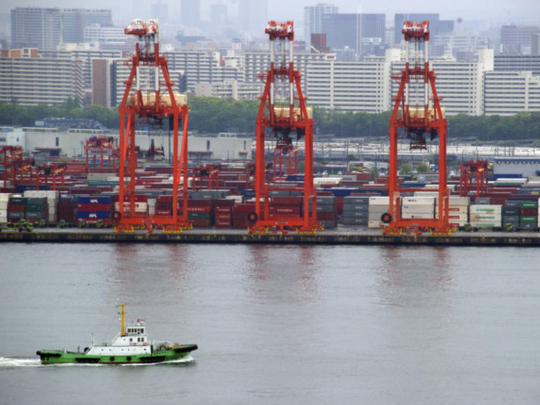
Tokyo: Japan’s economy expanded just 0.3 per cent in April-June, half the pace expected, raising doubts about the strength of the recovery as a rebound in consumer spending loses momentum and Europe’s debt crisis weighs on worldwide demand.
The cabinet figures on Monday provide fresh evidence of a global slowdown as growth in the United States, Europe and China flounders, raising expectations in financial markets that policymakers will take action to lift the world economy.
Economists had expected Japan’s growth to pull back to 0.6 per cent after a strong expansion of 1.3 per cent in the first quarter when government subsidies on low-emission cars drove private consumption up at its fastest pace in three years.
But private consumption was weaker than expected and exports, traditionally the driver of Japan’s economic growth, shaved 0.1 percentage point off of the quarter’s gross domestic product.
“As domestic demand is losing momentum and exports will likely weaken further due to Europe’s debt trouble, there is a possibility that Japan will go back into an economic lull in July-September,” said Yuichi Kodama, chief economist at Meiji Yasuda Life Insurance in Tokyo.
Policymakers expect reconstruction spending after last year’s earthquake and tsunami to support economic activity until early next year.
But global headwinds and the yen’s strength are raising increasing worries among policymakers and companies about the prospects for already weakening exports.
Just last week, Bank of Japan Governor Masaaki Shirakawa warned the fallout from Europe’s debt crisis was broadening and may delay a pickup in key markets for Japanese goods like the United States and China.
Analysts have slashed their forecasts for Japan’s factory output, which is closely tied to the country’s exports, as the slowdown in the global economy becomes more pronounced.
“Europe’s sovereign debt crisis remains a major risk to Japan and the global economy,” said Tatsushi Shikano, senior economist at Mitsubishi UFJ Morgan Stanley Securities in Tokyo.
“The Bank of Japan will likely take a wait-and-see stance but it could act again next month if financial turmoil and further monetary easing by the US Federal Reserve prompt a spike in the yen, threatening Japanese exporters’ earnings and the economy’s recovery prospects,” Shikano said.
Slowdown eyed
Despite the slowdown, April-June growth of 0.3 per cent is close to Japan’s average quarterly growth over the last decade of 0.24 per cent, suggesting a pull back to its long-term trend.
Indeed, Economics Minister Motohisa Furukawa said Japan’s economy was growing at a healthy pace. The slowdown was largely a reaction to unusually strong growth in the previous quarter, he said.
“Japan’s economy continues in an uptrend led by domestic demand,” Furukawa told a news conference, although he added that the government would consider a supplementary budget to support the economy “if necessary”.
On an annualised basis, the world’s third-largest economy grew 1.4 per cent in the April-June quarter, less that the median 2.5 per cent forecast and slightly below the 1.5 per cent annualised pace of the United States. The US economy had expanded at a 2.0 per cent pace in the January-March quarter.
China’s economy grew in the second quarter 7.6 per cent from a year earlier, down from 8.1 per cent in the first quarter. The euro zone is expected to report on Tuesday that the bloc’s economy shrank 0.2 per cent in April-to-June compared with the previous quarter.
Growth in Japan’s private consumption, which makes up about 60 per cent of the economy, slowed to just 0.1 p ercent from 1.2 per cent in the previous quarter.
The sharp slowdown, well short of a median estimate of 0.3 per cent, cast doubt on whether consumption will sustain its momentum once the boost from stimulus measures fades. Subsidies on low-emission cars are set to run out in August.
Worries over the economic outlook are already taking a toll on consumer confidence, which worsened in July from June.
It could take a further blow after parliament last week approved plans to double Japan’s 5-per cent consumption tax by 2015. Critics argue the higher tax will dampen domestic consumption, which contributed 0.4 percentage point to GDP in the latest figures.
At the BOJ, a growing number of officials had increasing doubts about the strength of Japan’s recovery even before Monday’s GDP figures due to the global fallout to the euro area debt crisis.
“Europe’s sovereign debt woes are already having a huge impact on the global economy,” Shirakawa told a news conference last week after the central bank left monetary policy unchanged.
“If the situation worsens further, it could trigger market turmoil or further cool global growth,” he said in a signal of the central bank readiness to further ease policy if economic conditions deteriorate.
Several exporters, including electronics giant Sony Corp. and carmaker Nissan Motor Corp, say the yen’s strength is hitting the bottom line.
Nissan said the yen cut 25.7 billion yen ($328 million) off its quarterly operating profit of 120.7 billion yen.
The currency has become a safe haven from the debt woes of Europe and the United States. It closed out the April-June quarter at 79.77 per dollar versus 82.79 in the previous quarter and was trading on Monday around 78.27.












